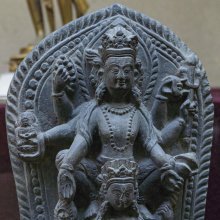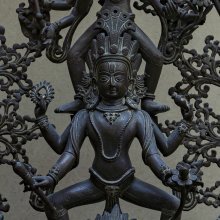Vahana, Vāhana: 27 definitions
Introduction:
Vahana means something in Buddhism, Pali, Hinduism, Sanskrit, the history of ancient India, Marathi, Jainism, Prakrit, Hindi. If you want to know the exact meaning, history, etymology or English translation of this term then check out the descriptions on this page. Add your comment or reference to a book if you want to contribute to this summary article.
Vahana has 26 English definitions available.
Alternative spellings of this word include Vahan.
Images (photo gallery)
(+64 more images available)
Languages of India and abroad
Sanskrit dictionary
[Deutsch Wörterbuch]
Source: Cologne Digital Sanskrit Dictionaries: Böhtlingk and Roth Grosses Petersburger WörterbuchVahana (वहन):—(von 1. vah)
1) adj. fahrend: varavimāna [Kathāsaritsāgara 43, 242. 119, 196.] führend, auf seinem Rücken tragend: rāja (nāga) [Mahābhārata 2, 2076.] —
2) n. a) das Fahren, Führen: haviṣām [Yāska’s Nirukta 7, 8.] havya (agneḥ) [Mahābhārata 2, 1146.] das Fliessen des Wassers [Yāska’s Nirukta 6, 2.] das Mitsichführen: maṇikusumādya der Krähen [Varāhamihira’s Bṛhajjātaka S. 95, 12.] das Tragen: dharābhāra [Spr. 5152.] — b) Schiff [Trikāṇḍaśeṣa 1, 2, 13.] [Hemacandra’s Abhidhānacintāmaṇi 876.] [Kathāsaritsāgara 25, 45. 26, 7. 123.] — c) der unterste Theil einer Säule [Varāhamihira’s Bṛhajjātaka S. 53, 29.] udvahana dass. Cit. beim [Scholiast] — Vgl. cakṣurvahana, pūrvāgni, soma .
--- OR ---
Vāhana (वाहन):—(vom caus. von 1. vah)
1) adj. tragend: madvadhū (siṃha) [Kathāsaritsāgara 22, 134.] jāmātṛ (haya) [30, 101.] nāgānāṃ vāhanā meghāḥ [124, 223. 221.] bringend: svapnottamaḥ satyavāhanaḥ [Rājataraṅgiṇī 4, 100.] —
2) m. Nomen proprium eines Muni [Oxforder Handschriften 55,b,22.] —
3) n. a) Zugthier, Gespann, Reitthier, Vehikel überh. [Amarakoṣa 2, 8, 2, 26. 3, 4, 25, 181.] [Hemacandra’s Abhidhānacintāmaṇi 221. 759.] [Halāyudha 2, 294.] am Ende eines adj. comp. f. ā [Mahābhārata 3, 11279.] [Rāmāyaṇa] [Gorresio 2, 125, 2.] [Kathāsaritsāgara 20, 164.] gardabhaḥ sarveṣāṃ vāhanānāmanāśiṣṭhaḥ [Aitareyabrāhmaṇa 4, 9.] [The Śatapathabrāhmaṇa 1, 8, 2, 9. 2, 1, 4, 4. 4, 4, 4, 10.] [Manu’s Gesetzbuch 7, 75. 222. 8, 113. 419.] [Mahābhārata 3, 2129. 13, 352. 4855. 14, 75. fg.] [Rāmāyaṇa] [Gorresio 2, 86, 2. 7, 16, 7.] [KĀM. NĪTIS. 7, 30. 12, 44. 13, 31. 80.] [Spr. 5408.] [Varāhamihira’s Bṛhajjātaka S. 4, 24. 9, 43. 46, 7. 27. 48, 68. 90, 8. 93, 12.] [Kathāsaritsāgara 20, 146. 30, 137. 43, 244.] [Naiṣadhacarita 22, 45.] [WEBER, Rāmatāpanīya Upaniṣad 288.] [Bhāgavatapurāṇa 6, 12, 17.] Häufig in Verbindung mit bala so v. a. Heer und Tross [Manu’s Gesetzbuch 7, 172. 9, 313.] [Mahābhārata 1, 6652. 2, 1074. 4, 993. 2219.] [Rāmāyaṇa 1, 53, 6.] [Rāmāyaṇa] [Gorresio 1, 16, 11. 2, 101, 5. 5, 9, 51. 30, 2. 73, 4.] [Spr. 768.] [Mārkāṇḍeyapurāṇa 37, 9.] hṛṣṭavāhanapūruṣa [Yājñavalkya’s Gesetzbuch 1, 347.] prayayau puṇḍarīkākṣaḥ śaibyasugrīvavāhanaḥ Ross [Mahābhārata 2, 35. 555. 4, 319.] śrānta adj. [Rāmāyaṇa 1, 62, 1. 68, 1. 2, 68, 21. 71, 30.] [Raghuvaṃśa 1, 48. 9, 25.] [Kathāsaritsāgara 16, 91. 18, 106.] [Bhāgavatapurāṇa 9, 15, 31.] spṛṣṭvā kṣatriyo vāhanāyudham (śudhyati) Reitthier (Elephant oder Ross) [Manu’s Gesetzbuch 5, 99.] [Mahābhārata 13, 3724.] [Kathāsaritsāgara 7, 13. 12, 134.] yajñeśa [Bhāgavatapurāṇa 6, 6, 22.] [PAÑCAR. 1, 1, 76.] [Pañcatantra 198, 5.] [Hitopadeśa 126, 16.] Auch m.: kaṃsasyaiva sa vāhanaḥ [Harivaṃśa 3113. 5884] (n. in der neueren Ausg.). — Wagen [The Śatapathabrāhmaṇa 9, 4, 2, 11.] [Rāmāyaṇa] [Gorresio 2, 109, 35. 3, 56, 52.] [Spr. 4423.] in comp. mit der Last (wobei das na in ṇa verwandelt wird, wenn ra oder ṣa vorhergehen) [Pāṇini’s acht Bücher 8, 4, 8.] śaravāhaṇa, darbha, ikṣu [Scholiast] Schiff [Oxforder Handschriften 151,a,6.] Am Ende eines adj. comp. (f. ā) nach dem näher angegebenen Vehikel so v. a. fahrend in, reitend auf: syandana [Harivaṃśa 4426.] nāga [10998.] siṃha [Kathāsaritsāgara 22, 79.] haṃsa [Bhāgavatapurāṇa 7, 3, 16.] garuḍa [8, 10, 2.] In der Stelle vanyavāhanahantar [Kathāsaritsāgara 21, 30] bedeutet das Wort Thier überh. — b) Ruder (Comm.) oder Segel [Rāmāyaṇa 2, 52, 5.] — c) nom. act. das Ziehen, Tragen (eines Zugthieres, eines Reitthieres oder Trägers) [Mahābhārata 5, 473. 13, 4755.] śivikā [Rāmāyaṇa 4, 24, 18.] [Pañcatantra 83, 19. 198, 6. 253, 13.] [Hitopadeśa ed. JOHNS. 1705.] das Fahren [Suśruta 1, 119, 2. 244, 8. 277, 10.] das Reiten [Kathāsaritsāgara 62, 158. 160. fg.] [Spr. 3174.] das Lenken (der Rosse) [Mahābhārata 3, 2635.] — Vgl. uda, kavya, kravya, jala, dvija, deva, naga, nara, nṛ, pakṣa, pavana, purīṣa, purīṣya, puṣpa, pravara, praṣṭi, babhru, barhi, barhiṇa, bīja, bhāra, bhūta, bhūti, maṇi, madhu, mahiṣa, mṛga, megha, yajña, yama, ratha, rāja, rukma, vasu, vāji, vāyu, vāri, śāli, śikhi, śveta, hari, havya, hotra .
Sanskrit, also spelled संस्कृतम् (saṃskṛtam), is an ancient language of India commonly seen as the grandmother of the Indo-European language family (even English!). Closely allied with Prakrit and Pali, Sanskrit is more exhaustive in both grammar and terms and has the most extensive collection of literature in the world, greatly surpassing its sister-languages Greek and Latin.
See also (Relevant definitions)
Starts with: Vahana-kshamata, Vahana-shulka, Vahanabhanga, Vahanagara, Vahanaka, Vahanakara, Vahanakarashala, Vahanakarma, Vahanamandapa, Vahanapa, Vahanapatra, Vahanaprajnapti, Vahanasamyukta, Vahanashreshtha, Vahanata, Vahanatva, Vahanavapi, Vahanaya, Vahanayudha.
Ends with (+212): Abdavahana, Abhivahana, Abjavahana, Adhivahana, Adhyavahana, Agnivahana, Akhuvahana, Amitavahana, Amtarvahana, Anabhogavahana, Anantavahana, Angasamvahana, Anuvahana, Aparishrotavahana, Apavahana, Ashvahana, Ashvavahana, Atibharavahana, Atitavahana, Ativahana.
Full-text (+335): Rathavahana, Nirvahaṇa, Vrishavahana, Shikhivahana, Abjavahana, Pravahana, Varivahana, Harivahana, Shalivahana, Yamavahana, Upavahana, Mahishavahana, Simhavahana, Vadhana, Naravahana, Havyavahana, Vahanabhanga, Roshavahana, Samvahana, Hamsavahana.
Relevant text
Search found 71 books and stories containing Vahana, Vāhana, Vahāṇa, Vāhāṇa, Vāhaṇa, Vāhanā, Vahaṇa, Vahaṇā, Vāhaṇā, Vahanā; (plurals include: Vahanas, Vāhanas, Vahāṇas, Vāhāṇas, Vāhaṇas, Vāhanās, Vahaṇas, Vahaṇās, Vāhaṇās, Vahanās). You can also click to the full overview containing English textual excerpts. Below are direct links for the most relevant articles:
Animal Kingdom (Tiryak) in Epics (by Saranya P.S)
Garga Samhita (English) (by Danavir Goswami)
Verse 3.2.14 < [Chapter 2 - The Great Festival of Śrī Girirāja]
Verse 2.14.3 < [Chapter 14 - Description of Kāliya’s Story]
Verse 6.4.22 < [Chapter 4 - Journey to the City of Kuṇḍina]
Jain Remains of Ancient Bengal (by Shubha Majumder)
Tīrthaṅkara Pārśvanātha with Planetary deities and Dikpālas type < [Chapter 6 - Iconographic Study of Jaina Sculptural Remains]
Śāsanadevīs or Yakṣiṇīs from Ancient Bengal < [Chapter 6 - Iconographic Study of Jaina Sculptural Remains]
The Markandeya Purana (by Frederick Eden Pargiter)
Canto LXXXVI - The Devī-Māhātmya: The slaying of Dhūmralocana
Canto XCIV - The Raucya and future Manvantaras
Temples of Munnur (Historical Study) (by R. Muthuraman)
The Brahmotsavam Festival < [Chapter 6]
Images of Siddhi Vinayaka < [Chapter 5]
Images of Subramanya < [Chapter 5]
Lord Jhulelal: An Analytical Study (by Thakkar Harish Gopalji)
Part 5.1 - Lord Jhulelal’s Iconography < [Chapter 4 - Analysis]
Part 11 - Lord (Adhipati) and Guardian (Dikpal) of West (Paschim) < [Chapter 4 - Analysis]
Related products






